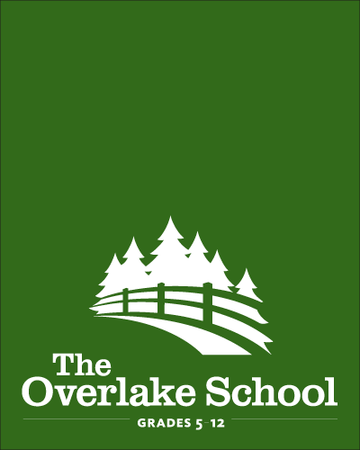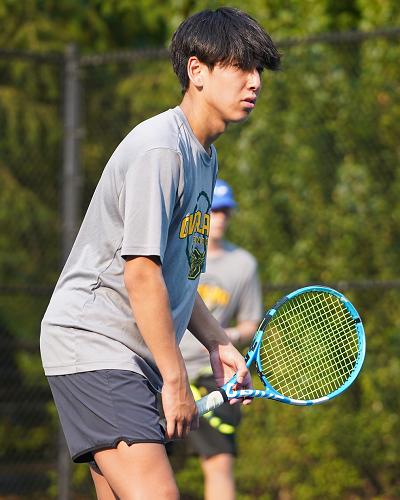DECA Club members head to State Competition

“When three seniors four years ago approached me and asked if I would be an advisor for a new DECA club, I had no idea what they were talking about,” exclaims Dave Parsons. “I think they came to me because I had just started teaching AP Econ., and so they thought I was the person to ask.”
That short conversation between a few eager students has evolved into a rather robust club at Overlake with more than 40 Overlake students participating. Senior, Ivy H., remembers back to her freshman year. “My first year was actually the first year that Overlake had a DECA club, so it was a learning experience for everyone – only two people competed, and most of us still had no idea what a competition was.”
But fast forward just a few years and Ivy, along with fellow Senior Max Z. are the student co-leaders of the club and making a name for themselves in the process. Both Ivy & Max are headed to State competitions later this spring, along with nine other Overlakers. It’s an impressive showing considering Overlake’s DECA team is a club, not a class.
“We are the only school that competes in our area (regarded as the most competitive area in the state) that doesn’t have DECA as a class,” explains Ivy. “The other schools have DECA classes, where students are taught about business, marketing, finance, communications, etc., and they compete as a part of the class. In our club, we don’t really have the general expertise to teach about these different aspects of business, so if students want to compete, 90% of the knowledge they need will be learned in self-guided studying and research. Dave (our advisor), Max, and I all give plenty of advice on how competitions work, what professional attire to wear, what a business plan should look like, how to present to judges, etc., but the technical aspects of their events are all on them.”
And to no surprise to any of us at Overlake, our students are up to the challenge. “There is an atmosphere of hard work and dedication all throughout Overlake, which I see come through in how hard all of these students work to master their events, even when there isn’t a grade on the line,” says Ivy. Parsons agrees with that assessment and says despite not having a DECA class, Overlakers have plenty of public speaking skills. “What Overlake students do have is years of experience in speaking and presenting in groups. They have the confidence and ability to communicate effectively to the judges.”
Rachel S. (’22) has been in the club for several years after her sister encouraged her to sign up. Now both are headed to State. “Overlake has done an excellent job of teaching public speaking skills, which makes the DECA presentations feel like a walk in the park. All the speeches and presentations in my humanities classes and all my reports/lab write-ups in my STEM classes have helped me a TON with DECA. I am able to articulate my thoughts in a more organized and fluid way. Being up against hundreds of other participants from the area only motivates me to work harder to represent Overlake and show these other schools that a club like ours can hang.”
DECA is basically students working through problem-solving simulations. “They get a problem to solve, a short time period to prepare their response, and then meet with a judge from the Business/Finance world who assesses their performance,” explains Parsons.
And in DECA, the judges may be faculty or staff from the various schools represented, but also parent volunteers. Mary Pund, parent of two juniors at Overlake, volunteered to be a judge at the recent regional competition, which was held virtually. She judged other schools on a marketing plan for a pseudo home improvement chain’s hiring fair. “While I missed seeing all of the students in person, the DECA virtual competition was so easy to judge, and in some ways, I think it was fairer. I could watch the student presentations at a time that worked for my own schedule. The other benefit was that I could pause the video and rewind if necessary, to make sure I could accurately judge a contestant’s response to each question or performance indicator.”
“These roleplays have allowed me to become quite a master of thinking on my feet while maintaining composure and professionalism,” explains Addie S. (’22). “I have found these skills most useful in recent job interviews where I was required to use these same skills.”
Parsons says the experience students get from participating in DECA folds in nicely to students interested in business-related careers, however even if they choose to take a different path in life, the skills developed now will certainly pay off in the future. “There is something special about dressing professionally, walking up to an expert (the judge), introducing themselves and explaining to this professional how they have a solution to the problem that is in the prompt,” explains Parsons. “It is a real boost to self-confidence and overall growth. DECA promotes a series of "21st Century Skills" based on effective communication and decision making.”
For Ivy, her experience is not over, as she prepares along with others to compete in State. But, being in the last semester of her senior year, it’s a time to be nostalgic. “Max and I have seen the club go from a small handful of curious students, to a giant group of passionate and hard-working students, so of course I hope this trend continues after we graduate. Both of us have high confidence in the rising leaders in the club, and I have no doubt that DECA will continue to provide students with amazing opportunities to learn and gain valuable experiences.”
Best of luck at State DECA club!



